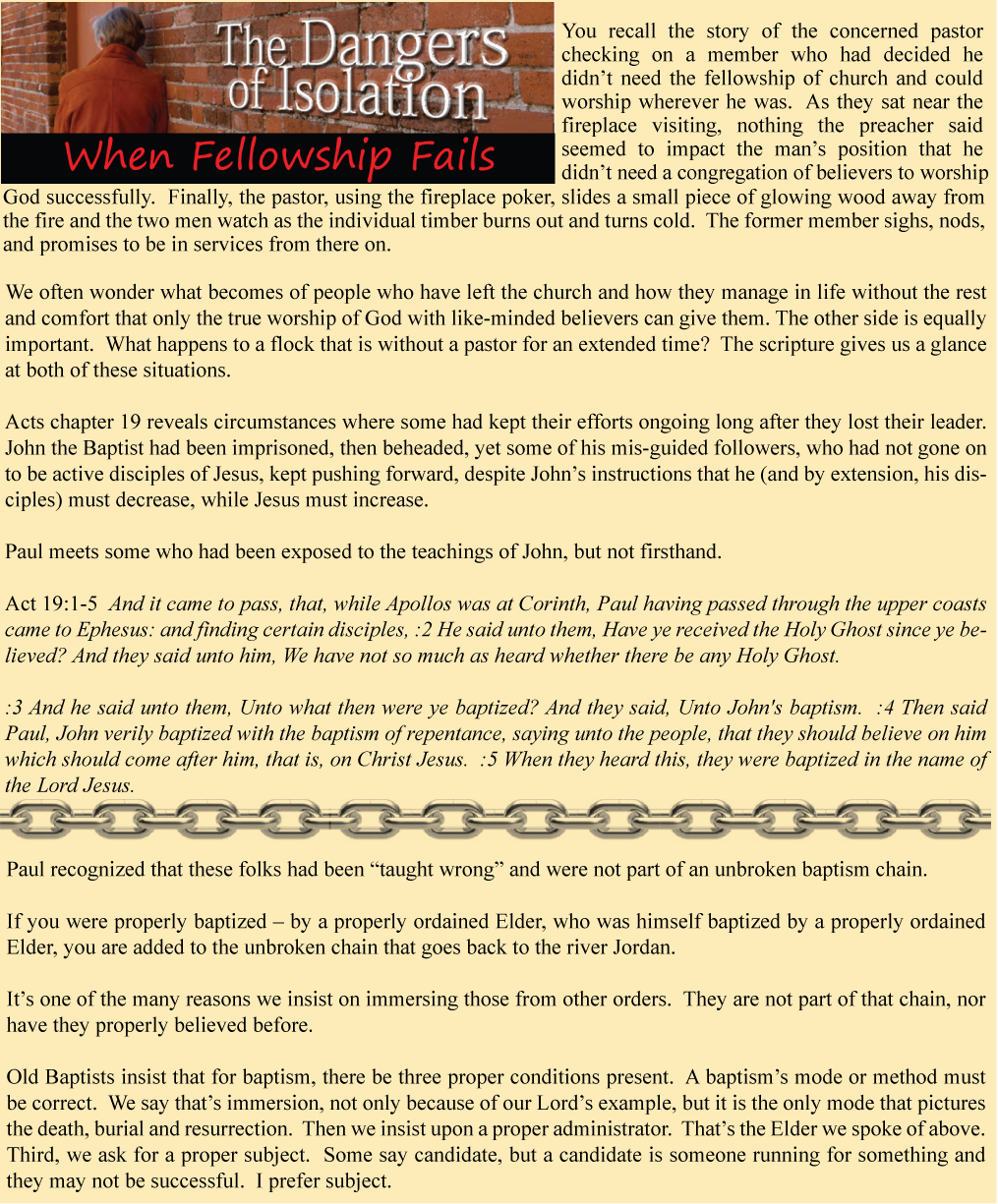
|
I think we should include a fourth proper: Proper doctrine. Maybe we call it something else Ė proper belief, proper understanding, but when the subject comes forward for baptism and says something outside of our view of the doctrines of grace, that is, takes some credit for the salvation by their act of submission Ė thatís not a condition we can accept. Would we want someone coming up out of the water proclaiming they had accepted Christ and finished the job of salvation?
What takes place at baptism is multi-fold. Baptism is a public example, a public admission that Christ has died for your sins, a confession that you are unable to do anything on your own regarding salvation and that you are answering the good conscience God has given you by this step.
Itís also a betrothal ceremony. The subject is publicly taking the name of Christ, agreeing to walk in a certain, righteous way henceforth. There are some, who having been baptized among the Old Baptists, turn away after a time and end up among another people. This verse should put that behavior in perspective:
Exd 20:7 Thou shalt not take the name of the LORD thy God in vain; for the LORD will not hold him guiltless that taketh his name in vain.
It isnít talking about profaning the name by verbally cursing as so many teach. Itís taking the name and later disregarding it. Itís walking away from the marriage. Youíve taken the name of a husband, but you donít wear it as you should, as the visible bride. Youíve taken it for no reason, or in vain.
When I suggest a fourth proper, the proper doctrine, itís intended to keep well-meaning or over-emotional people from being swept up in the moment, caught up in Spirit-filled preaching and desiring to be married before they know to whom they are being betrothed. Iíve seen many come this way, wanting to join before they understood the doctrines of grace. We shouldnít ask them to take a test and put their knowledge under a microscope, but there is something to be said for inquiring about an experience, seeking proof of the new birth.
Paul recognized the folks in Acts 19 didnít recognize the bridegroom, the real Jesus. They couldnít answer legitimate questions about the bridegroom and the gifts he gave the bride. Act 19:2 He said unto them, Have ye received the Holy Ghost since ye believed? And they said unto him, We have not so much as heard whether there be any Holy Ghost.
So serious was Paul about this illegitimacy, he required another ceremony, but first, they were educated. The reading of Acts makes it sound as if Paul mentioned the name of Christ Jesus and that was all it took. I suspect in-between Acts 19:4 and 19:5, Paul told in great detail about the one they were going to join in that watery grave.
Of course, the situation regarding John the Baptist was unique, but in normal circumstance, had another pastor stepped in when John was apprehended, the proper education of members would have continued.
When you step away from that path and try to go it on your own, it becomes harder after time to even recognize the original path.
Letís visit the disciples of John, one more time. Here are those who were in the wilderness with the forerunner of Christ. They heard the man preach, they saw the Lamb of God appear, they saw His baptism, and they beheld the Spirit descend on Him like a dove. They heard the voice of God declare him. Luk 3:22 And the Holy Ghost descended in a bodily shape like a dove upon him, and a voice came from heaven, which said, Thou art my beloved Son; in thee I am well pleased.
But John is arrested, they depart and the next time we hear of them, they have gone completely away from their position and doctrine. Listen as they confront Christ: Mat 9:14 Then came to him the disciples of John, saying, Why do we and the Pharisees fast oft, but thy disciples fast not?
Do you see that? The disciples of John, a flock without guidance or a pastor, have now aligned themselves with the Pharisees, whom John called a generation of vipers. Mat 3:7 But when he saw many of the Pharisees and Sadducees come to his baptism, he said unto them, O generation of vipers, who hath warned you to flee from the wrath to come?
Moses, Luke and Paul all warned us to take heed: Heb 3:12 Take heed, brethren, lest there be in any of you an evil heart of unbelief, in departing from the living God.
Isolation from the flock works against a preacher as well. John was born of God in his motherís womb. A true Old Testament high priest called of God to come in the spirit and power of Elijah. John was honored of God to baptize the redeemer. He touched the savior and heard the voice of God. Yet after the arrest - Mat 11:3 And said unto him, Art thou he that should come, or do we look for another?
His remoteness had caused him to doubt. So much so, he sends a coded message to the Messiah.
Luk 7:17 And this rumour of him went forth throughout all Judaea, and throughout all the region round about. 7:18 And the disciples of John shewed him of all these things. 7:19 And John calling unto him two of his disciples sent them to Jesus, saying, Art thou he that should come? or look we for another?
Art thou he that should come? or look we for another? Consider the weight of this statement by the blessed Baptist. Surely his isolation hadnít come to the point where he was in disbelief. For just mere moments before, his remaining disciples told of the miracles of Jesus.
But John was sending a coded message. ďYou have the power to instantly free me from this prison and coming fate.Ē How is this not different than Satanís charge in the wilderness? ďIf thou be the Son of GodÖĒ
Luk 7:20 When the men were come unto him, they said, John Baptist hath sent us unto thee, saying, Art thou he that should come? or look we for another? :21 And in that same hour he cured many of their infirmities and plagues, and of evil spirits; and unto many that were blind he gave sight. :22 Then Jesus answering said unto them, Go your way, and tell John what things ye have seen and heard; how that the blind see, the lame walk, the lepers are cleansed, the deaf hear, the dead are raised, to the poor the gospel is preached.
Luk 7:23 And blessed is he, whosoever shall not be offended in me.
And Jesus responds in code. Remind him again, and let him know, heís blessed and he should not be offended or angry at Jesus because these things must happen.
How often do we forget what Christ has done on our behalf? How many times have unfortunate circumstances in our lives caused us to be offended at God?
I like the ending of the book of Matthew, because it caused me to ponder the strange wording.
Mat 28:20 Teaching them to observe all things whatsoever I have commanded you: and, lo, I am with you alway, even unto the end of the world. Amen.
I always thought it was wrongly worded and should have read ďlo, I am with you until the end of the world, and alway.Ē
But when I considered it and prayed, I came away with this: Heís with us unto the end of the world; after that, weíre with him.
Perfect wording after all.
Brother Royce Ellis |
|
|

